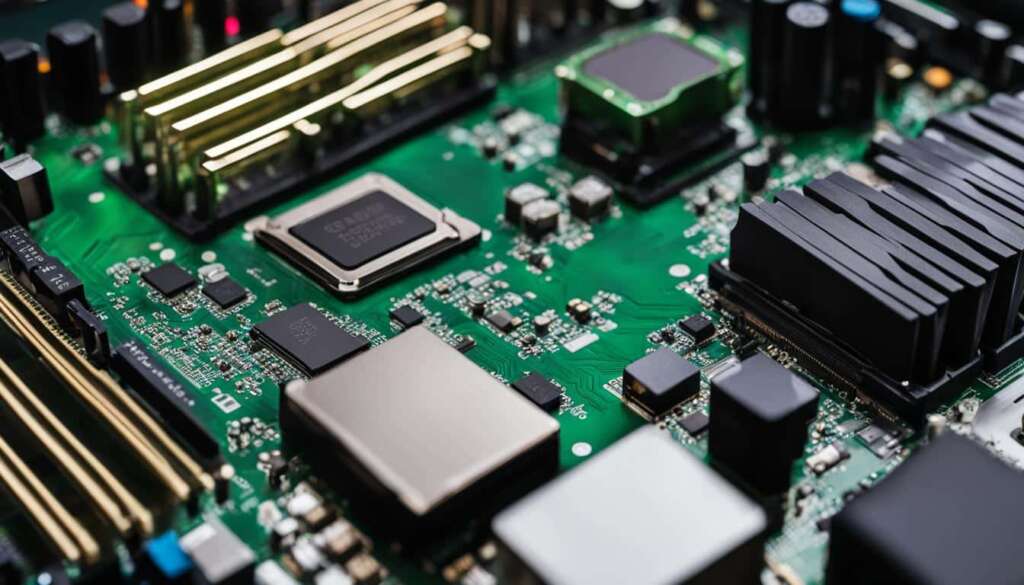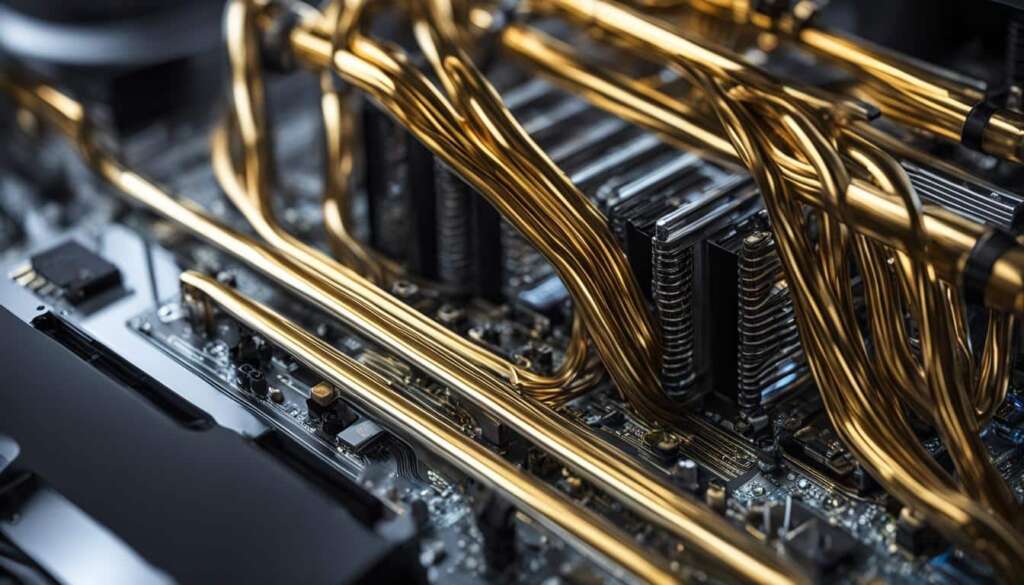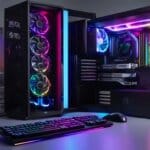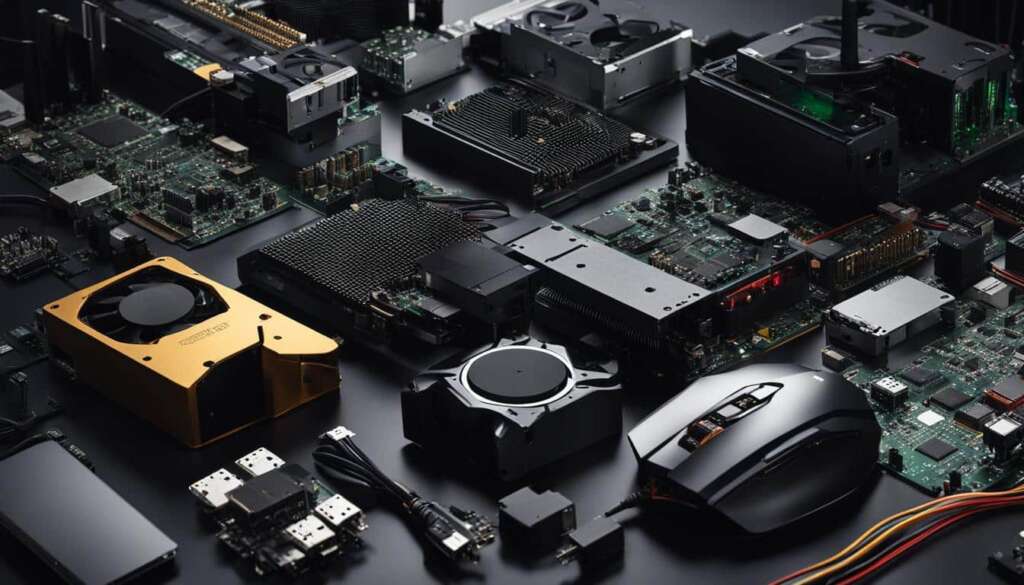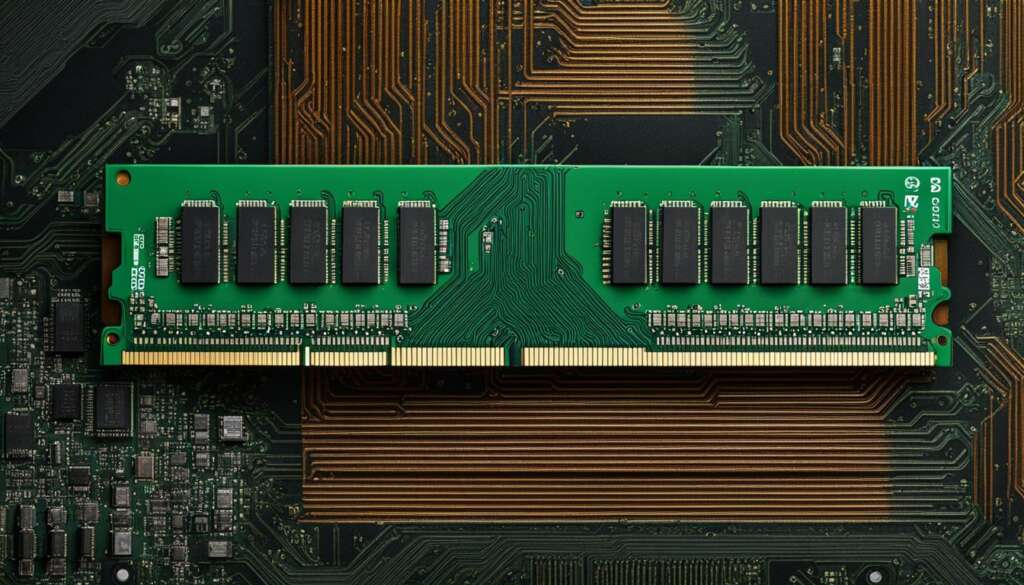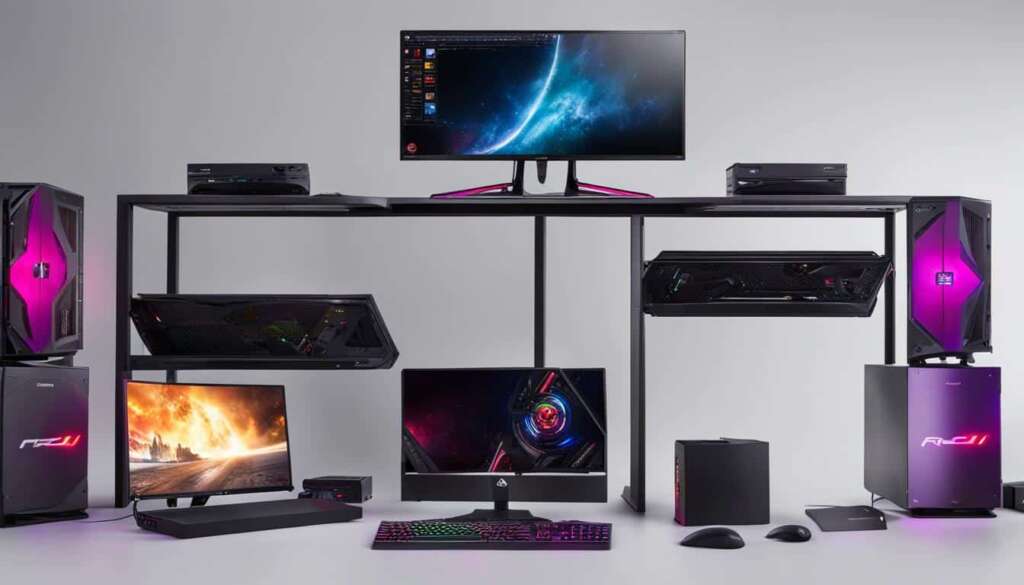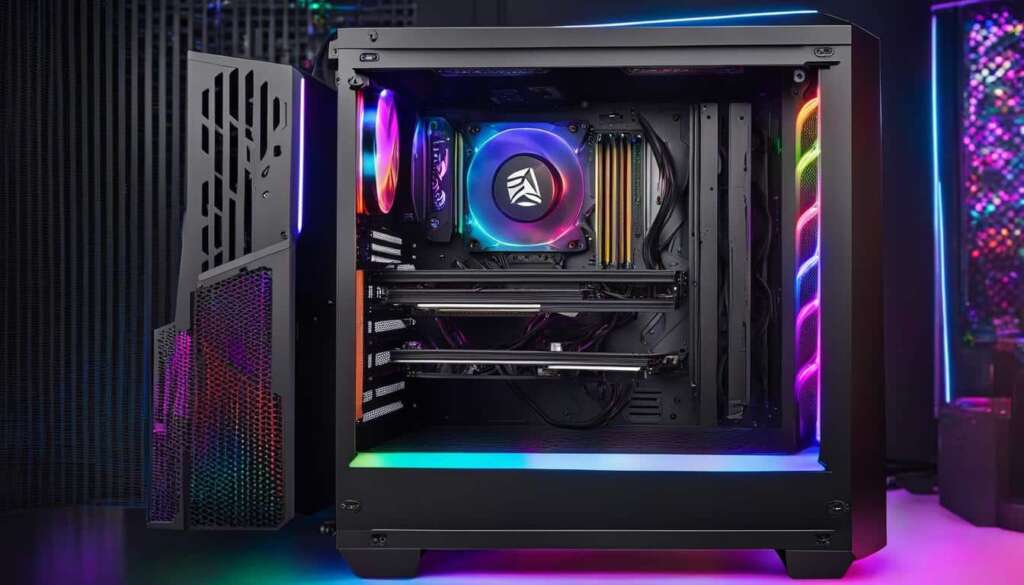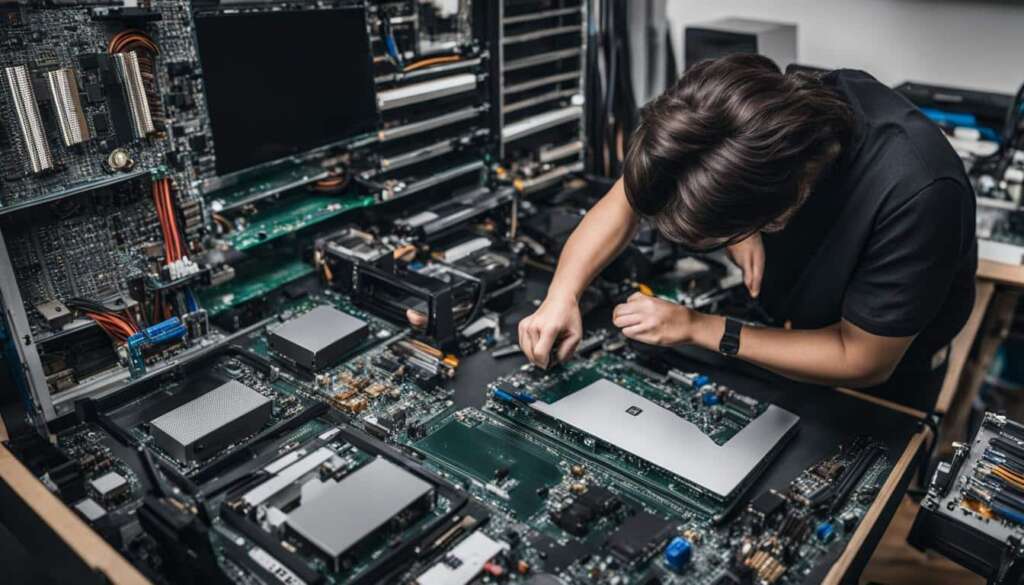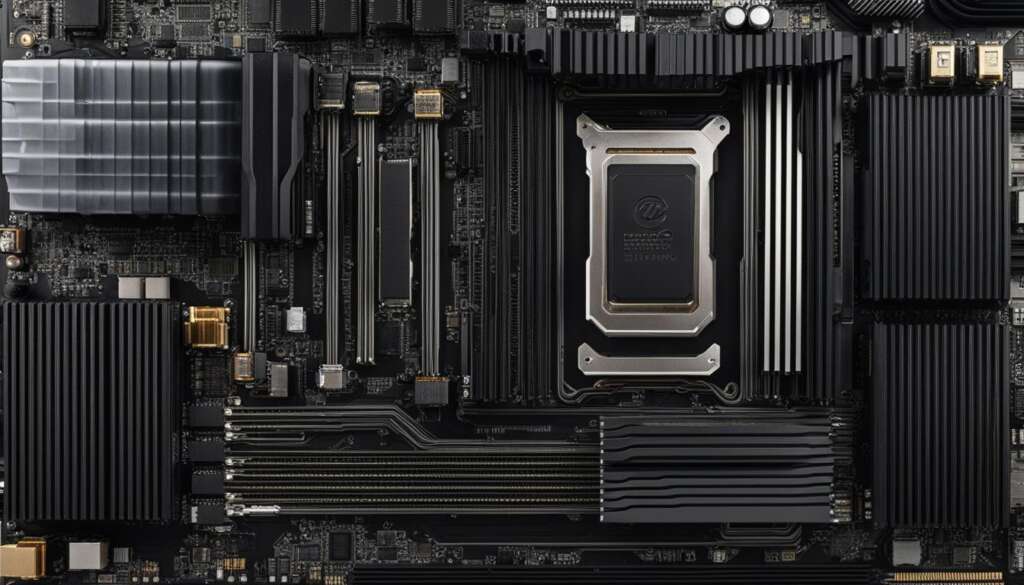Table of Contents
When building a gaming PC, it can be overwhelming to choose the right components. However, with the right guidance, this process can be simplified. The key PC parts you need to consider include the case, motherboard, CPU, GPU, RAM, power supply unit, hard drive, cooling, gaming peripherals, and gaming monitors. Each of these components plays a crucial role in the performance and functionality of your gaming PC.
Key Takeaways:
- Choosing the best PC parts is essential for building a high-performance gaming PC.
- Consider the compatibility and specifications of each component when making your choices.
- PC parts include the case, motherboard, CPU, GPU, RAM, power supply unit, hard drive, cooling, gaming peripherals, and gaming monitors.
- Research and compare different options to find the best fit for your budget and gaming needs.
- Consult expert guides and reviews to gather additional knowledge and make informed decisions.
Choosing the Right Gaming Computer Case
When building a gaming PC, one of the most important decisions you’ll need to make is choosing the right gaming computer case. The case not only houses all your other PC components but also plays a vital role in the overall functionality and performance of your gaming rig. To ensure you make the best choice, consider the following factors:
Size and Compatibility
The size of your gaming computer case is crucial as it determines the type and number of components you can install. There are three main types of cases: full tower, mid-tower, and mini tower. Full tower cases offer ample space for larger motherboards, multiple graphics cards, and extensive cooling options. Mid-tower cases strike a balance between size and expandability, making them the most popular choice for gamers. Mini tower cases, on the other hand, are compact and suitable for small form factor builds. Make sure to check the compatibility of your chosen case with your motherboard, graphics card, and cooling system.
Cooling Options
Gaming PCs generate a significant amount of heat, so it’s crucial to select a case with adequate cooling options. Look for cases that offer support for multiple fans or liquid cooling systems. Additional features like dust filters and proper airflow designs can help keep your components cool and running optimally, even during intense gaming sessions.
Expandability and Cable Management
Consider the future expandability of your gaming PC when selecting a case. Look for cases that offer additional drive bays and expansion slots, allowing you to upgrade your system as needed. Additionally, pay attention to cable management options, as a well-organized interior not only improves airflow but also makes your build look clean and professional.
Visual Appeal and Customization
Gaming PCs are not just about performance; they’re also about aesthetics. Choose a case that reflects your personal style and offers customization options. Cases with tempered glass side panels allow you to showcase your components and RGB lighting, adding a touch of visual flair to your gaming setup.
By carefully considering these factors, you can select the right gaming computer case that not only accommodates your components but also enhances your gaming experience.
| Case Type | Size | Compatibility | Cooling Options | Expandability | Cable Management | Visual Appeal |
|---|---|---|---|---|---|---|
| Full Tower | Larger | Supports larger motherboards and multiple graphics cards | Ample space for fans and liquid cooling | Extensive expansion options | Good cable management options | Showcases components and RGB lighting |
| Mid-Tower | Moderate | Most popular choice | Supports multiple fans and liquid cooling | Balanced expansion options | Decent cable management options | Allows some component showcasing |
| Mini Tower | Compact | Suitable for small form factor builds | Limited cooling options | Restricted expansion options | Challenging cable management | Compact and space-saving |
Selecting the Perfect CPU for Your Gaming PC
When it comes to building a gaming PC, selecting the right CPU is crucial for unlocking the full potential of your system. The CPU, or central processing unit, acts as the brain of your gaming rig, handling all the calculations and processing tasks required to run your games smoothly.
When choosing a CPU for your gaming PC, there are several factors to consider. First, you’ll want to think about the core count and thread count. More cores and threads generally result in better multitasking performance and smoother gameplay. Additionally, clock speed plays a role in determining how quickly the CPU can execute instructions. It’s important to find the right balance between core count, thread count, and clock speed to meet your gaming needs.
Compatibility is another crucial factor to keep in mind when selecting a CPU. You’ll need to ensure that your chosen CPU is compatible with your motherboard. Different CPUs and motherboards use different socket types, so be sure to check the specifications before making a purchase.
When it comes to gaming CPUs, two popular options that offer a range of choices are Intel Core and AMD Ryzen processors. Intel Core processors are known for their strong single-core performance and high clock speeds, making them a great choice for gaming. On the other hand, AMD Ryzen processors excel in tasks that benefit from multiple cores and threads, making them ideal for multitasking and content creation alongside gaming.
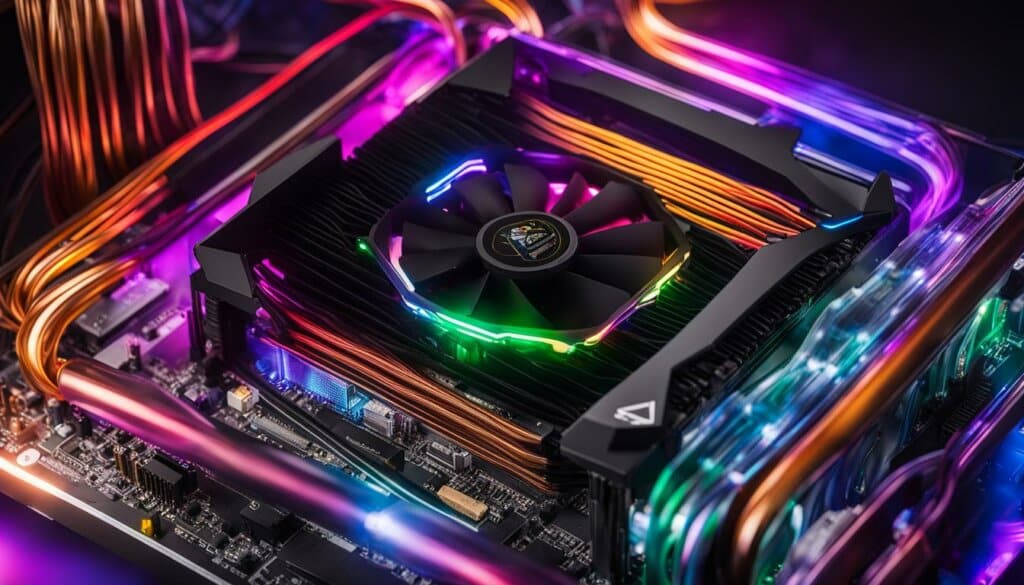
Comparing Intel Core and AMD Ryzen Processors
| Intel Core | AMD Ryzen | |
|---|---|---|
| Core Count | 2 to 10 | 6 to 16 |
| Thread Count | 4 to 20 | 12 to 32 |
| Base Clock Speed | 2.0 GHz to 3.9 GHz | 3.6 GHz to 4.9 GHz |
| Boost Clock Speed | 4.3 GHz to 5.3 GHz | 4.2 GHz to 5.3 GHz |
| Price Range | £100 to £500+ | £150 to £700+ |
Choosing the right CPU for your gaming PC can greatly impact your overall gaming experience. It’s important to consider your specific needs and budget when making a decision. Remember to also check for user reviews and benchmarks to get a better understanding of how different CPUs perform in real-world scenarios.
Ultimately, whether you choose an Intel Core or AMD Ryzen processor, both options offer excellent performance for gaming. The key is to find the CPU that best suits your gaming requirements and budget. By carefully considering factors such as core count, thread count, clock speed, and compatibility, you can ensure that your gaming PC is equipped with a powerful CPU that delivers the performance you desire.
Finding the Best Graphics Card for Gaming
When it comes to gaming, the graphics card, also known as the GPU, is an essential component that can significantly impact your gaming experience. The graphics card is responsible for rendering and displaying visuals on your monitor, making it crucial for achieving smooth gameplay and stunning graphics.
When selecting a graphics card for your gaming PC, several factors need to be considered. Firstly, you should take into account the VRAM or video RAM, which determines the card’s ability to handle higher resolutions and textures. The higher the VRAM, the better the performance and ability to handle more demanding games.
Budget is another important consideration when choosing a gaming graphics card. Graphics cards come in various price ranges, and it’s essential to find a balance between performance and affordability. Consider your gaming needs and the types of games you intend to play to determine the appropriate budget for your graphics card.
“The graphics card is like the engine of your gaming PC. It can make or break your gaming experience. It’s crucial to choose a graphics card that can handle the demands of the latest games and provide a smooth and immersive gaming experience.”
Additionally, compatibility is key when selecting a graphics card. Ensure that the card is compatible with your motherboard and power supply unit. Check for the required power connectors and ensure that your power supply can handle the card’s power requirements. It’s also essential to consider the physical dimensions of the graphics card and ensure it fits inside your chosen computer case.
In conclusion, finding the best graphics card for gaming involves considering factors such as VRAM, budget, compatibility, and physical dimensions. By making informed decisions based on these factors, you can ensure that your gaming PC is equipped with a graphics card that delivers optimal performance and enhances your gaming experience.
Conclusion
Building a gaming PC requires careful consideration of the various components, including the case, CPU, GPU, RAM, and power supply. By choosing the right pc parts, you can create a gaming setup that delivers optimal performance and functionality for your gaming needs.
When it comes to pc upgrades, it’s important to ensure compatibility between the components. Make sure to choose pc accessories that are compatible with your existing hardware to avoid any compatibility issues. This will ensure a smooth and seamless gaming experience.
In addition to the core components, don’t forget to explore computer accessories that can enhance your gaming setup. From gaming keyboards and mice to high-quality gaming monitors, these peripherals can take your gaming experience to the next level.
As you embark on your gaming PC build journey, remember to consider factors such as performance, budget, and compatibility. With the right pc upgrades and computer accessories, you can create a gaming rig that not only meets your gaming needs but also provides an immersive and enjoyable gaming experience.
FAQ
What are the key PC parts to consider when building a gaming PC?
The key PC parts to consider when building a gaming PC include the case, motherboard, CPU, GPU, RAM, power supply unit, hard drive, cooling, gaming peripherals, and gaming monitors.
What should I consider when selecting a gaming computer case?
When selecting a gaming computer case, consider factors such as the size of your motherboard, the number of fans or cooling systems you plan to install, and the compatibility of your graphics card. The three main types of cases are full tower, mid-tower, and mini tower, each offering different dimensions and expandability options.
How do I choose the right CPU for my gaming PC?
When choosing a CPU for your gaming PC, consider factors such as core count, thread count, clock speed, and compatibility with your chosen motherboard. Popular options include Intel Core and AMD Ryzen processors, which offer a range of options for different budget and performance needs.
What should I consider when selecting a graphics card for gaming?
When selecting a graphics card for gaming, consider factors such as VRAM (video RAM), budget, ports compatibility, game requirements, monitor refresh rate, power supply requirements, and case compatibility. Options from both NVIDIA and AMD offer a range of performance levels to suit different gaming needs.
How do I ensure compatibility between PC components when building a gaming PC?
To ensure compatibility between PC components when building a gaming PC, it is important to choose components that are compatible with each other and meet your specific gaming needs. Consider factors such as performance, budget, and compatibility when making your selections.
What other gaming accessories should I consider for my gaming setup?
In addition to PC components, you can also explore gaming peripherals and accessories to enhance your gaming setup. These may include gaming keyboards, mice, headsets, controllers, and gaming monitors.

